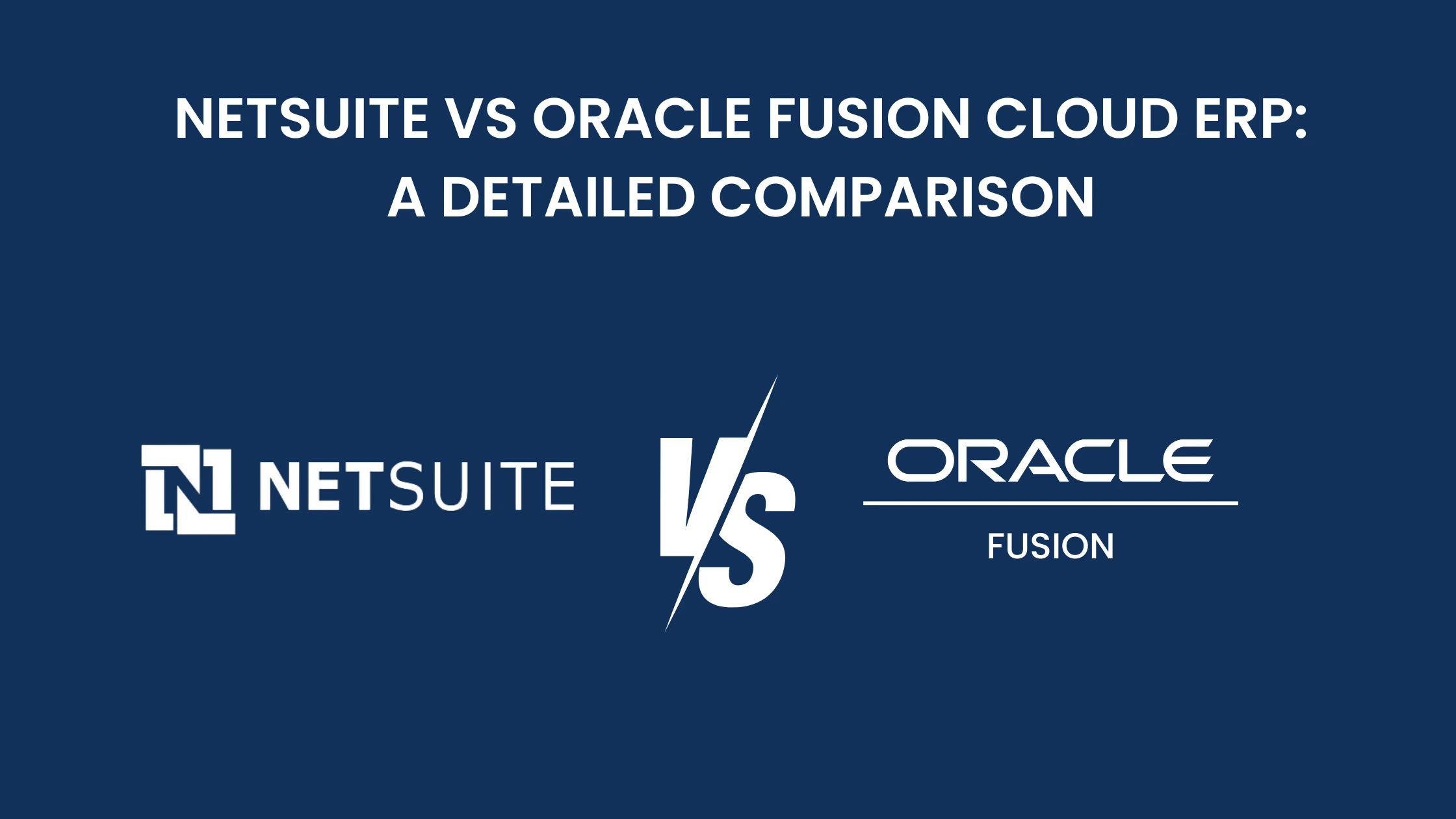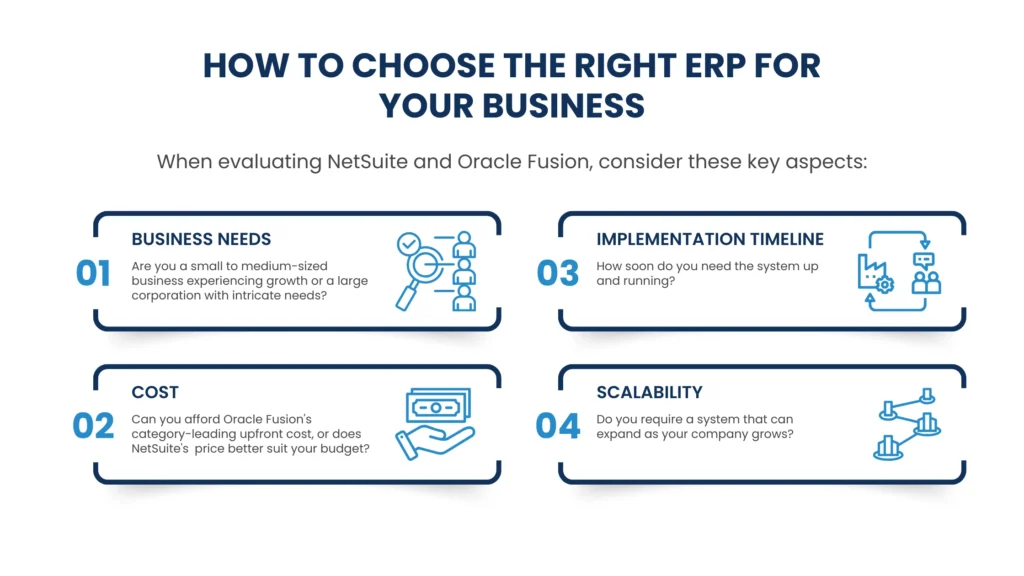
- February 14, 2025
- Developer
- 0
NetSuite vs Oracle Fusion Cloud ERP: A Detailed Comparison
ERP systems demand is immense, and with reason! A Gartner survey found that almost two-thirds of companies report they already have or will implement an ERP system in three years. However, considering the absence of ERP vendors, selecting the right solution can be daunting. As one of the top players in technology solutions, Oracle has brought two of the most exciting platforms to market: NetSuite and Oracle Fusion Cloud ERP.
If you're in the market for a new ERP system, it helps to know how these two platforms compare. However, although both are robust and widely used, they serve different business requirements. So, when choosing between the two, which one is for you? Let's break it down.
NetSuite: An Overview
NetSuite, launched in 1998, is a cloud ERP solution dedicated to small and mid-sized businesses (SMBs). Its scalability makes it a good option for a growing company and well-established enterprise.
Key Features of NetSuite:
- Financial Management: Higher-level tools for assessing financial data and revenue recognition.
- Inventory Management: Real-time tracking and reporting of inventory.
- E-commerce Integration: Effortlessly create and oversee online retail platforms.
- Multiple Currency Support: Simplify international transactions.
- Real-Time Visibility: Create consistent processes across departments to aid in decision-making.
Reasons for NetSuite's Popularity Among Businesses:
- Scalability: Ideal for growing businesses.
- User-Friendly: Accessible cloud-based platform with an easy-to-navigate interface.
- Cost Efficient: Minimal upfront investment over Oracle Fusion
NetSuite powers over 50% of tech IPOs from 2022 and 84% of the businesses listed on the Forbes Cloud 100. It's a proven option for SMBs that require versatility and agility in deployment.
What is Oracle Fusion Cloud ERP?
Oracle Fusion Cloud ERP is part of the Oracle Cloud Suite and serves small and large enterprises. It is a more powerful solution with sophisticated customization and integration capabilities, which makes it excellent for large organizations with advanced requirements.
Key Features of Oracle Fusion:
- Finance Automation: this means tailoring advanced tools to simplify your financial processes.
- Supply Chain Management: Improved planning for demand, logistics, and production
- Human Resources: All-in-one HR tools to manage your workforce.
- Customer Service Tools: Optimize and make the best use of time.
- Role-Based Dashboard: Insights tailored to your role for better decision-making.
Why Businesses Choose Oracle Fusion:
- Extensive Customization: Customize the system to fit your specific business requirements.
- Comprehensive Automation: Enterprise-level sock-level automation
- Smooth Integration: Compatibility with other Oracle applications
It's worth noting that Oracle Fusion typically comes with higher costs and is more appropriate for businesses with the capacity to handle its complexity.
NetSuite vs. Oracle Fusion: A Detailed Comparison
1. Features and Functionality
- NetSuite: Strong in core ERP areas such as finance, inventory, CRM, and E-Commerce. It’s great for SMBs who want a simple, all-in-one solution.
- Oracle Fusion: More robust functionality includes advanced finance automation, procurement, and supply chain management. It is better for larger enterprises with sophisticated needs.
2. Ease of Use and Implementation
- NetSuite: This is based in the cloud and is easy to use with its intuitive interface. It is fast to implement and fosters remote work and real-work collaboration.
- Oracle Fusion: It offers multiple role-oriented dashboards and guided processes, but its hybrid deployment model may require more resources for implementation.
3. Scalability and Integration
- NetSuite: Highly scalable, multi-tenant cloud environment that’s easy to integrate with third-party applications.
- Oracle Fusion: Has good integration capabilities, but as it is a hybrid, implementation may take more time.
4. Cost Considerations
- NetSuite: Price varies by user, optional modules, and one-time implementation costs. Its upfront costs are lower, but its subscription rates are higher.
- Oracle Fusion: It is a subscription-based solution requiring a minimum of 10 users. While it comes at a higher cost, it offers advanced features tailored for larger businesses.
Pros and Cons
NetSuite
- Pros: Affordable, scalable, user-friendly, well suited for SMBs
- Cons: Less Advanced Features, limited customization options
Oracle Fusion
- Pros: Features rich, strong automation, and good Oracle tools integration
- Cons: More expensive and less flexible for legacy systems.

How to Choose the Right ERP for Your Business
When evaluating NetSuite and Oracle Fusion, consider these key aspects:
- Business Needs: Are you a small to medium-sized business experiencing growth or a large corporation with intricate needs?
- Cost: Can you afford Oracle Fusion’s category-leading upfront cost, or does NetSuite’s price better suit your budget?
- Implementation Timeline: How soon do you need the system up and running?
- Scalability: Do you require a system that can expand as your company grows?
Conclusion
While NetSuite and Oracle Fusion Cloud ERP are potent solutions, their use cases differ.
- NetSuite is an ideal ERP for SMBs that want a cost-effective, scalable, and user-friendly solution.
- Oracle Fusion, on the other hand, is more suitable for larger corporations requiring advanced customization options and sophisticated automation capabilities.
Choosing the right one depends on what your business needs, how much of your budget you have, and what your long-term goals are. ERP experts can help you make the right choice if you are confused about which system to choose!
Need Expert Help?
We are Livestrong Technologies, a NetSuite solutions provider offering NetSuite ERP Implementation. We can assist you in choosing the right ERP system for your business, be it features, functions, or implementation process. We can make your ERP journey smooth and prosperous.
Frequently Asked Questions (FAQs)
NetSuite is designed for smaller to medium-sized companies and provides essential ERP functionalities. In contrast, Oracle Fusion caters to larger corporations and offers a more comprehensive set of features.
NetSuite has a lower initial investment but higher ongoing subscription costs, whereas Oracle Fusion tends to have a higher overall investment per user.
Implementing NetSuite is likely to be easier as it has a friendly interface compared to Oracle Fusion, which may prove more complex and resource intensive.
Yes, they both integrate with third-party applications, but NetSuite has easier, more seamless integrations, whereas Oracle Fusion will require additional resources for complex integrations.
